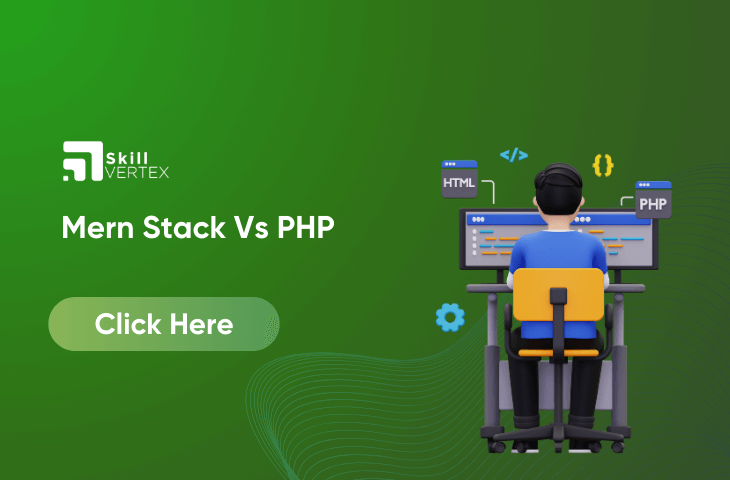Table of Contents
Mern Stack Vs PHP
In the dynamic landscape of web development, the choice of technology stack plays a pivotal role in shaping the efficiency and functionality of digital solutions. Two prominent contenders in this arena are the MERN stack, comprising MongoDB, Express.js, React, and Node.js, and PHP, a versatile server-side scripting language. Each brings its unique strengths and characteristics to the table. MERN, known for its JavaScript-based full-stack development, provides a seamless and efficient environment for building modern web applications. On the other hand, PHP, a stalwart in web development for decades, offers server-side scripting capabilities with a wide range of frameworks and applications. As we delve into the comparison between the MERN stack and PHP, we explore their features, use cases, and considerations to aid developers and businesses in making informed decisions based on their project requirements and objectives.
PHP Overview
PHP stands out as one of the most widely used scripting languages on the internet, renowned for its simplicity and ease of learning. Its popularity is further propelled by a vast developer community, making it a preferred choice for web development. With studies indicating its presence on over 244 million websites, PHP is not only widespread but also cost-effective as it is freely available. The language’s versatility is enhanced by numerous frameworks, streamlining the development process.
Notably, PHP’s scalability is exemplified by the development of major platforms such as Facebook and MySpace. The performance of a web application relies heavily on the interaction between the script, database, and server. PHP follows the LAMP stack, incorporating Apache, MySQL, PHP, and Linux, a trusted combination renowned for optimizing performance across a wide array of applications.
Advantages Of PHP
- Scalability: PHP excels at handling websites with substantial traffic, making it a robust choice for high-traffic platforms.
- Platform Independence: PHP is platform-independent, capable of running on various operating systems, enhancing its versatility for different environments.
- Web Server Compatibility: The framework seamlessly supports all major web servers, ensuring compatibility and ease of deployment.
- Performance Optimization: PHP contributes to the development of web applications and sites that load quickly by utilizing its own memory, reducing loading times.
- Large Developer Community: PHP boasts a large and active community of developers, facilitating easy access to support, resources, and shared knowledge for developers facing challenges or seeking guidance.
MEAN Stack Overview
The MEAN Stack, consisting of MongoDB, Express.js, AngularJS, and Node.js, offers a streamlined and cohesive approach to web development. Its key advantage over LAMP lies in its simplicity and standardized structure. MongoDB facilitates easy and flexible data storage, while Node.js simplifies server running. Express.js standardizes the website development process, and AngularJS adds interactive functionalities. Together, these components make data movement smoother and faster in the MEAN Stack, enhancing the overall efficiency of web development projects.
Advantages of MongoDB:
MongoDB serves as a highly beneficial database layer, offering modern features such as full cluster support and automatic sharding. It empowers the development, testing, and hosting of modern applications on the cloud, providing a versatile and scalable solution for data management.
Advantages of Node.js:
In comparison to LAMP, Node.js presents advantages by eliminating the challenges posed by numerous configuration files. Handling app route requests and query responses becomes simplified with the use of JavaScript. Node.js consolidates various processes into a single layer, streamlining the development process and overcoming the complexities associated with multiple layers in traditional stacks like LAMP.
The Benefits of JSON:
JSON, a widely used data interchange format, contributes to the seamless flow of data through different layers. Its simplicity and human-readable structure make it an efficient choice for data representation, aiding in the smooth communication between various components in a stack.
FAQ- Mern Stack Vs PHP
Q1. Which is better PHP or MERN?
Ans. The decision between the MERN stack and the traditional full stack (PHP, MySQL, etc.) hinges on the unique requirements and objectives of your project. The MERN stack, comprising MongoDB, Express, React, and Node.js, stands out as a popular and modern web development stack known for its efficiency and versatility.
Q2. Is PHP still in demand?
Ans. PHP remains in high demand and is considered among the top programming languages. Its support by major companies like Apple and Microsoft in their Integrated Development Environments (IDEs) further highlights its significance. Consequently, PHP development continues to offer promising career opportunities for beginners in 2023.
Q3. What language will replace PHP?
Ans. JavaScript is often regarded as the top alternative to PHP for web development. As the most widely used programming language globally, JavaScript is not limited to web development but extends its reach to mobile and desktop development, thanks to robust frameworks that enhance its versatility and applicability across various domains.
Hello, I’m Hridhya Manoj. I’m passionate about technology and its ever-evolving landscape. With a deep love for writing and a curious mind, I enjoy translating complex concepts into understandable, engaging content. Let’s explore the world of tech together

